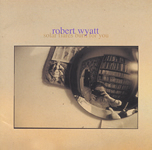|
|
 |
Dusted Reviews
Artist: Robert Wyatt Album: Solar Flares Burn For You Label: Cuneiform Review date: Nov. 9, 2003 |

|
|
|
 |
Robert Wyatt is one of the lesser-known legends who came to rise in the psychedelic ‘60s. Drummer for The Soft Machine – a jazz-rock fusion outfit that foresaw the rise of prog rock, was peer to The Pink Floyd and the opening act for The Jimi Hendrix Experience on their American tour – Wyatt went out on his own and formed Matching Mole in 1971. Mole followed in the footsteps of Soft Machine and released only one album before Wyatt took some time off to reflect and pursue more personal projects. When his girlfriend got hired to work on the set of the Nicolas Roeg film Don’t Look Now, filming on location off the Italian coast, Wyatt joined her and found himself with a new keyboard and plenty of solitude. Somewhere in the ocean waves, he started to envision material for an album. After returning, Wyatt put a band together. But before rehearsals were to begin, he fell from a window and broke his spine, never to walk again. After what must have been a painful rehabilitation, he returned to his work and gave the world Rock Bottom, one of the most beautiful and poetic albums in rock history. A harrowing and mysterious record, it remains an acquired taste, yet highly influential, with its layers of sounds well ahead of the 4-track bedroom recording aesthetic of the ‘80s and ‘90s.
The recent release of Solar Flares Burn for You is a collection that dates mostly from 1972-74, before and after the release of Rock Bottom. Included are two sessions recorded for the BBC, the title soundtrack for an experimental film from 1973, as well as a few recently recorded tracks exclusive to the release. Wyatt appears to have taken an active role in the release and provides photos and artwork for the already extensive liner notes. As if that wasn’t enough, they also tag on a Quicktime version of the album’s namesake film.
Judging this release as merely archival and geared more towards the Wyatt enthusiast would belittle the intensity of Wyatt’s craft. The simpler arrangements from the 1974 radio session differ dramatically from the multi-track wonderland of Rock Bottom and are an absolute pleasure to hear. The album opens with a solo piano version of “Alifib”, which alone is worth the price of the disc. The 1972 BBC set, recorded before Wyatt’s paralysis, includes the brief ditties “Fol de Rol”, and “Righteous Rhumba”. Both show the lyrically playful Wyatt a lot cheerier than on Rock Bottom, but reveal the first signs of the abstract lyricism to come. The three recent recordings, two of which are collaborations with Hugh Hopper, are made up of Hopper’s loops and Wyatt’s moody cornet. The final track, a home recorded demo called “The Verb” is designed to whet the appetite for his latest full-length Cuckooland. The aged and tired Wyatt takes this final moment to share his struggles with a people presumably apathetic to the pervasive killing in this world.
While Solar Flares will titillate Wyatt fans, it also has plenty of moments suitable for the Wyatt novice. Robert Wyatt remains a unique figure in the world of music. It is rare to witness someone lyrically poetic, politically convicted and musically innovative all at the same time. Solar Flares manages to encompass all of these elements and serves as a fair introduction to his world.
By Ted Sonnenschein
|







